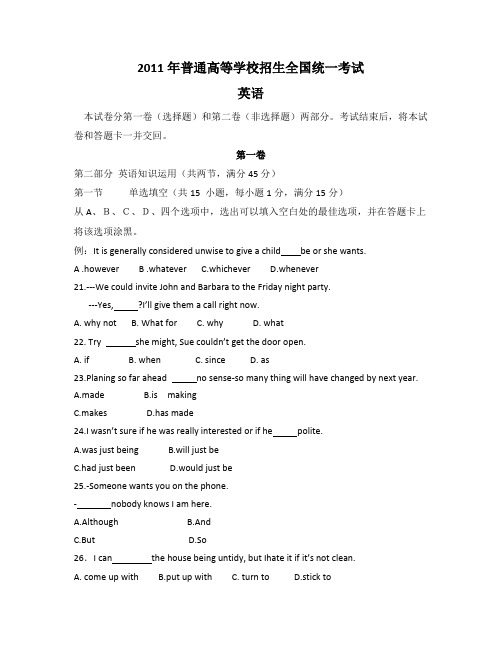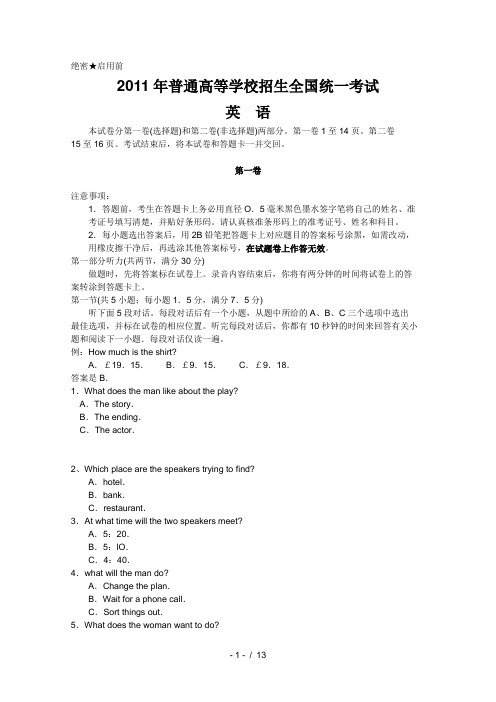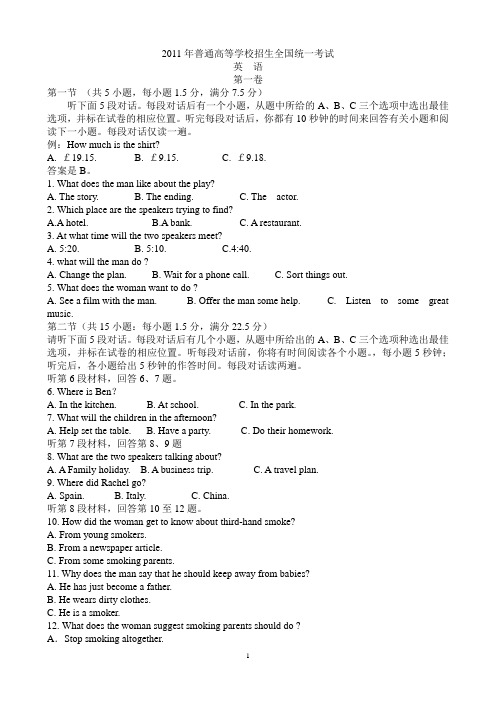2011年全国各地高考英语试题下载-重庆卷[Word校对版]
- 格式:doc
- 大小:123.00 KB
- 文档页数:14

2011年普通高等学校招生全国统一考试英语本试卷分第一卷(选择题)和第二卷(非选择题)两部分。
考试结束后,将本试卷和答题卡一并交回。
第一卷第二部分英语知识运用(共两节,满分45分)第一节单选填空(共15 小题,每小题1分,满分15分)从A、B、C、D、四个选项中,选出可以填入空白处的最佳选项,并在答题卡上将该选项涂黑。
例:It is generally considered unwise to give a child be or she wants.A .howeverB .whatever C.whichever D.whenever21.---We could invite John and Barbara to the Friday night party.---Yes, ?I’ll give them a call right now.A. why notB. What forC. whyD. what22. Try she might, Sue couldn’t get the door open.A. ifB. whenC. sinceD. as23.Planing so far ahead no sense-so many thing will have changed by next year.A.madeB.is makingC.makesD.has made24.I wasn’t sure if he was really interested or if he polite.A.was just beingB.will just beC.had just beenD.would just be25.-Someone wants you on the phone.- nobody knows I am here.A.AlthoughB.AndC.ButD.So26.I can the house being untidy, but Ihate it if it’s not clean.A. come up withB.put up withC. turn toD.stick to27.The next thing he saw was smoke from behind the house.A.roseB.risingC. to riseD.risen28.Only when he reached the tea-house it was the same place he’d been in last year.A. he realizedB.he did realizeC.realized heD.did he realize29.When Alice came to, she did not know how long she there.A.had been lyingB.has been lyingC.was lyingD.has lain30.The form cannot be signed by anyone yourself.A.rather thanB.other thanC.more thanD.better than31.The prize will go to the writer story shows the most imagination.A.thatB.whichC.whoseD.what32.They have arrived at lunchtime but their flight was delayed.A.willB.canC.mustD.should33.It is generally accepted that boy must learn to stand up and fight like man.A.a;aB.a;theC.the;theD.a;不填34.William found it increasingly difficult to read, for his eyesight was beginning to . A.disappear B.fall C.fail D.damage35.—Artistic people can be very difficult sometimes.—Well, you married one. .A.You name itB.I’ve got itC.I can’t agree moreD.You should know第二节完形填空(共20小题:每小题1.5分,满分30分)阅读下面的短文,从短文后各题所给的四个选项(A、B、C和D)中,选出可以填入空白处的最佳选项,并在答题卡上将该项涂黑。

2011高考英语阅读理解真题(重庆卷)(英语学习)There was a gardener who looked after his garden with great care. To water his flowers, he used two buckers. One was a shiny and new bucket. The other was a very old and dilapidated one, which had seen many years of service, but was now past its best.Every morning, the gardener would fill up the two buckets. Then he would carry them along the path, one on each side, to the flowerbeds. The new bucket was very proud of itself. It could carry a full bucket of water without a single drop spilled (溢出). The old bucket felt very ashamed because of its holes: before it reached the flowerbeds, much water had leaked along the path.Sometimes the new bucket would say, “See how capable I am! How good it is that the gardener has me to water the flowers every day! I don’t know why he still bothers with you. What a waste of space you are!”And all that the old bucket could say was, “I know I’m not very useful, but I can only do my best. I’m happy that the gardener still finds a li ttle bit of use in me, at least.”One day, the gardener heard that kind or conversation. Afterwatering the flowers as usual, he said, “You both have done your work very well. Now I am going to carry you back. I want you to look carefully along the pa th.”Then the two buckets did so. All along the path, they noticed, on the side where the new bucket was carried, there was just bare (光秃秃的) earth; on the onther side where the old bucket was carried, there was a joyous row of wild flowers, leading all the way to the garden.56. What does the underlined word “dilapidated” probably meanA. DirtyB. DarkC. Worn-outD. Plain-looking.57. What was the old bucket ashamed ofA. His past.B. His aging.C. His manner.D. His leaking.58. The new bucket made conversations with the old one mainly toA. laugth at the old oneB. take pity on the old oneC. show off its beautiful looksD. praise the gardener’s kindness59. Why was the old bucket still kept by the gardenerA. Because it was used to keep a balanceB. Because it stayed in its besr conditionC. Because it was taken as a treasureD. Because it had its own function【答案】CDAD。

使用于:河南、黑龙江、吉林、宁夏、陕西、海南、山西、新疆省份.2011年新课标高考英语(科)试题第一卷注意事项:1.回答第一卷前,考生务必将自己的姓名、准考证号、填写在答题卡上。
2.选出每小题答案后,用2B铅笔把答题卡上对应题目的答案标号涂黑。
如需改动、用橡皮擦干净后,再选涂其他答案标号。
不能答在本试卷上,否则无效。
第一部分听力(共两节,满分30分)做题时先将答案标在试卷上。
录音内容结束后,你将有两分钟的时间将试卷上的答案转涂到答题卡上。
第一节(共5小题;每小题l.5分,满分7.5分)听下面五段对话。
每段对话后有一小题,从题中所给的A、B、C三个选项中选出最佳选项,并标在试卷的相应位置。
听完每段对话后,你都有10秒钟的时间来回答有关小题和阅读下一小题。
每段对话仅读一遍。
例:How much is the shirt?A.£19.15.B.£9.15.C.£9.18.答案是B。
1.What does the man like about the play?A.The storyB.The endingC.The actor2.Which place are the speakers trying to find?A.A hotel.B.A bank..C..A restaurant.3.What time will the two speakers meet?A.5:30B.5:10C.4:404.What will the man do?A.Change the plan.B.Wait for a phone call.C.Sort tings suit.5.What does the woman want to do?A.See a film with the man.B.Offer th e man some help.C.Listen to some great music.第二节(共15小题;每小题1.5分,满分22.5分)听下面5段对话或独白。

绝密★启用前2011年普通高等学校招生全国统一考试英语本试卷分第一卷(选择题)和第二卷(非选择题)两部分。
第一卷1至14页。
第二卷15至16页。
考试结束后,将本试卷和答题卡一并交回。
第一卷注意事项:1.答题前,考生在答题卡上务必用直径O.5毫米黑色墨水签字笔将自己的姓名、准考证号填写清楚,并贴好条形码。
请认真核准条形码上的准考证号、姓名和科目。
2.每小题选出答案后,用2B铅笔把答题卡上对应题目的答案标号涂黑,如需改动,用橡皮擦干净后,再选涂其他答案标号,在试题卷上作答无效。
第一部分听力(共两节,满分30分)做题时,先将答案标在试卷上。
录音内容结束后,你将有两分钟的时间将试卷上的答案转涂到答题卡上。
第一节(共5小题;每小题1.5分,满分7.5分)听下面5段对话。
每段对话后有一个小题,从题中所给的A、B、C三个选项中选出最佳选项,并标在试卷的相应位置。
听完每段对话后,你都有10秒钟的时间来回答有关小题和阅读下一小题.每段对话仅读一遍。
例:How much is the shirt?A.£19.15.B.£9.15.C.£9.18.答案是B.1.What does the man like about the play?A.The story.B.The ending.C.The actor.2、Which place are the speakers trying to find?A.hotel.B.bank.C.restaurant.3.At what time will the two speakers meet?A.5:20.B.5:lO.C.4:40.4.what will the man do?A.Change the plan.B.Wait for a phone call.C.Sort things out.5.What does the woman want to do?A.See a film with the man.B.Offer the mall some help.C.Listen to some great music.第二节(共1 5小题:每小题1.5分,满分22.5分)听下面5段对话。

2011年普通高等学校招生全国统一考试英语本试卷分第一卷(选择题)和第二卷(非选择题)两部分。
第一卷1至14页。
第二卷15至16页。
考试结束后,将本试卷和答题卡一并交回。
第一卷注意事项:1.答题前,考生在答题卡上务必用直径O.5毫米黑色墨水签字笔将自己的姓名、准考证号填写清楚,并贴好条形码。
请认真核准条形码上的准考证号、姓名和科目。
2.每小题选出答案后,用2B铅笔把答题卡上对应题目的答案标号涂黑,如需改动,用橡皮擦干净后,再选涂其他答案标号,在试题卷上作答无效。
第一部分听力(共两节,满分30分)做题时,先将答案标在试卷上。
录音内容结束后,你将有两分钟的时间将试卷上的答案转涂到答题卡上。
第一节(共5小题;每小题1.5分,满分7.5分)听下面5段对话。
每段对话后有一个小题,从题中所给的A、B、C三个选项中选出最佳选项,并标在试卷的相应位置。
听完每段对话后,你都有10秒钟的时间来回答有关小题和阅读下一小题.每段对话仅读一遍。
例:How much is the shirt?A.£19.15. B.£9.15. C.£9.18.答案是B.1.What does the man like about the play?A.The story.B.The ending.C.The actor.2、Which place are the speakers trying to find?A.hotel.B.bank.C.restaurant.3.At what time will the two speakers meet?A.5:20.B.5:lO.C.4:40.4.what will the man do?A.Change the plan.B.Wait for a phone call.C.Sort things out.5.What does the woman want to do?.See a film with the man.AB.Offer the mall some help.C.Listen to some great music.第二节(共1 5小题:每小题1.5分,满分22.5分)听下面5段对话。

2011年普通高等学校招生全国统一考试英语第一卷第一节(共5小题,每小题1.5分,满分7.5分)听下面5段对话。
每段对话后有一个小题,从题中所给的A、B、C三个选项中选出最佳选项,并标在试卷的相应位置。
听完每段对话后,你都有10秒钟的时间来回答有关小题和阅读下一小题。
每段对话仅读一遍。
例:How much is the shirt?A. £19.15.B. £9.15.C. £9.18.答案是B。
1. What does the man like about the play?A. The story.B. The ending.C. The actor.2. Which place are the speakers trying to find?A.A hotel.B.A bank.C. A restaurant.3. At what time will the two speakers meet?A. 5:20.B. 5:10.C.4:40.4. what will the man do ?A. Change the plan.B. Wait for a phone call.C. Sort things out.5. What does the woman want to do ?A. See a film with the man.B. Offer the man some help.C. Listen to some great music.第二节(共15小题:每小题1.5分,满分22.5分)请听下面5段对话。
每段对话后有几个小题,从题中所给出的A、B、C三个选项种选出最佳选项,并标在试卷的相应位置。
听每段对话前,你将有时间阅读各个小题。
,每小题5秒钟;听完后,各小题给出5秒钟的作答时间。
每段对话读两遍。
听第6段材料,回答6、7题。
6. Where is Ben?A. In the kitchen.B. At school.C. In the park.7. What will the children in the afternoon?A. Help set the table.B. Have a party.C. Do their homework.听第7段材料,回答第8、9题8. What are the two speakers talking about?A. A Family holiday.B. A business trip.C. A travel plan.9. Where did Rachel go?A. Spain.B. Italy.C. China.听第8段材料,回答第10至12题。
绝密★启用前2011年普通高等学校招生全国统一考试英语本试卷分第一卷(选择题)和第二卷(非选择题)两部分。
第一卷1至14页。
第二卷15至16页。
考试结束后,将本试卷和答题卡一并交回。
第一卷注意事项:1. 答题前,考生在答题卡上务必用直径0. 5毫米黑色墨水签字笔将自己的姓名、准考证号填写清楚,并贴好条形码。
请认真核准条形码上的准考证号、姓名和科目。
2. 每小题选出答案后,用2B铅笔把答题卡上对应题目的答案标号涂黑,如需改动,用橡皮擦干净后,再选涂其他答案标号,在试题卷上作答无效。
第一部分听力(共两节,满分30分)做题时,先将答案标在试卷上。
录音内容结束后,你将有两分钟的时间将试卷上的答案转涂到答题卡上。
第一节(共5小题,每小题1.5分,满分7.5分)听下面5段对话。
每段对话后有一个小题,从题中所给的A、B、C三个选项中选出最佳选项,并标在试卷的相应位置。
听完每段对话后,你都有10秒钟的时间来回答有关小题和阅读下一小题。
每段对话仅读一遍。
例:How much is the shirt?A. £19.15.B. £9.15.C. £9.18.答案是B。
1. What does the man like about the play?A. The story.B. The ending.C. The actor.2. Which place are the speakers trying to find?A.A hotel.B.A bank.C. A restaurant.3. At what time will the two speakers meet?A. 5:20.B. 5:10.C.4:40.4. what will the man do ?A. Change the plan.B. Wait for a phone call.C. Sort things out.5. What does the woman want to do ?A. See a film with the man.B. Offer the man some help.C. Listen to some great music. 第二节(共15小题:每小题1.5分,满分22.5分)请听下面5段对话。
2011年各省高考英语听力真题+MP3下载+听力答案前言:这是2011年各省高考英语听力真题,是本人自己收集的,希望给需要的人以帮助)2011年高考英语听力mp3下载(全国卷)下载地址(使用迅雷下载,复制网址即可下载)/m2/tingli/gaokao/2011/00 12e908.mp3听下面5段对话。
每段对话后有一个小题,从题中所给的A、B、C三个选项中选出最佳选项,并标在试卷的相应位置。
听完每段对话后,你都有10秒钟的时间来回来有关小题和阅读下一小题。
每段对话仅读一遍。
例:How much is the shirt?A. £19.15.B. £9.15.C. £9.18.答案是B。
1. What does the man like about the play?A. The story.B. The ending.C. The actor.2. Which place are the speakers trying to find?A. A hotel.B. A bank.C. A restaurant.3. At what time will the two speakers meet?A. 5:20.B. 5:10.C.4:40.4. What will the man do ?A. Change the plan.B. Wait for a phone call.C. Sort things out.5. What does the woman want to do ?A. See a film with the man.B. Offer the man some helpC. Listen to some great music.听下面5段对话。
每段对话后有几个小题,从题中所给出的A、B、C三个选项种选出最佳选项,并标在试卷的相应位置。
听每段对话前,你将有时间阅读各个小题,每小题5秒钟;听完后,各小题给出5秒钟的作答时间。
2011年普通高等学校招生全国统一考试(全国新课标卷)--------2 2011年普通高等学校招生全国统一考试(北京卷)-----------13 2011年普通高等学校招生全国统一考试(安徽卷)-----------25 2011年普通高等学校招生全国统一考试(福建卷)-----------36 2011年普通高等学校招生全国统一考试(广东卷)-----------52 2011年普通高等学校招生全国统一考试(海南卷)-----------61 2011年普通高等学校招生全国统一考试(湖北卷)-----------73 2011年普通高等学校招生全国统一考试(湖南卷)-----------92 2011年普通高等学校招生全国统一考试(江苏卷)-----------102 2011年普通高等学校招生全国统一考试(江西卷)-----------120 2011年普通高等学校招生全国统一考试(辽宁卷)-----------130 2011年普通高等学校招生全国统一考试(全国卷)-----------139 2011年普通高等学校招生全国统一考试(山东卷)-----------150 2011年普通高等学校招生全国统一考试(陕西卷)-----------159 2011年普通高等学校招生全国统一考试(四川卷)-----------173 2011年普通高等学校招生全国统一考试(天津卷)-----------187 2011年普通高等学校招生全国统一考试(浙江卷)-----------201绝密★启用前2011年普通高等学校招生全国统一考试英语本试卷分第一卷(选择题)和第二卷(非选择题)两部分。
第一卷1至14页。
第二卷15至16页。
考试结束后,将本试卷和答题卡一并交回。
第一卷注意事项:1.答题前,考生在答题卡上务必用直径O.5毫米黑色墨水签字笔将自己的姓名、准考证号填写清楚,并贴好条形码。
请认真核准条形码上的准考证号、姓名和科目。
CAD是Computer Aided Design的缩写,指计算机辅助设计,Autodesk公司的AutoCAD是目前应用广泛的CAD软件,具有完善的图形绘制功能、强大的图形编辑功能、可采用多种方式进行二次开发或用户定制、可进行多种图形格式的转换,具有较强的数据交换能力,同时支持多种硬件设备和操作平台,还可以通过多种应用软件适应于建筑、机械、测绘、电子、服装以及航空航天等行业的设计需求。
这些整理出来的快捷键命令,应该是比较全的了。
(一)字母类1、对象特性ADC, *ADCENTER(设计中心“Ctrl+2”)CH, MO *PROPERTIES(修改特性“Ctrl+1”)MA, *MATCHPROP(属性匹配)ST, *STYLE(文字样式)COL, *COLOR(设置颜色)LA, *LAYER(图层操作)LT, *LINETYPE(线形)LTS, *LTSCALE(线形比例)LW, *LWEIGHT (线宽)UN, *UNITS(图形单位)ATT, *ATTDEF(属性定义)ATE, *ATTEDIT(编辑属性)BO, *BOUNDARY(边界创建,包括创建闭合多段线和面域)AL, *ALIGN(对齐)EXIT, *QUIT(退出)EXP, *EXPORT(输出其它格式文件)IMP, *IMPORT(输入文件)OP,PR *OPTIONS(自定义CAD设置)PRINT, *PLOT(打印)PU, *PURGE(清除垃圾)R, *REDRAW(重新生成)REN, *RENAME(重命名)SN, *SNAP(捕捉栅格)DS, *DSETTINGS(设置极轴追踪)OS, *OSNAP(设置捕捉模式)PRE, *PREVIEW(打印预览)TO, *TOOLBAR(工具栏)V, *VIEW(命名视图)AA, *AREA(面积)DI, *DIST(距离)LI, *LIST(显示图形数据信息)2、绘图命令:PO, *POINT(点)L, *LINE(直线)XL, *XLINE(射线)PL, *PLINE(多段线)ML, *MLINE(多线)SPL, *SPLINE(样条曲线)POL, *POLYGON(正多边形)REC, *RECTANGLE(矩形)C, *CIRCLE(圆)A, *ARC(圆弧)DO, *DONUT(圆环)EL, *ELLIPSE(椭圆)REG, *REGION(面域)MT, *MTEXT(多行文本)T, *MTEXT(多行文本)B, *BLOCK(块定义)I, *INSERT(插入块)W, *WBLOCK(定义块文件)DIV, *DIVIDE(等分)H, *BHATCH(填充)3、修改命令:CO, *COPY(复制)MI, *MIRROR(镜像)AR, *ARRAY(阵列)O, *OFFSET(偏移)RO, *ROTATE(旋转)M, *MOVE(移动)E, DEL键 *ERASE(删除)X, *EXPLODE(分解)TR, *TRIM(修剪)EX, *EXTEND(延伸)S, *STRETCH(拉伸)LEN, *LENGTHEN(直线拉长)SC, *SCALE(比例缩放)BR, *BREAK(打断)CHA, *CHAMFER(倒角)F, *FILLET(倒圆角)PE, *PEDIT(多段线编辑)ED, *DDEDIT(修改文本)4、视窗缩放:P, *PAN(平移)Z+空格+空格, *实时缩放Z, *局部放大Z+P, *返回上一视图Z+E, *显示全图5、尺寸标注:DLI, *DIMLINEAR(直线标注)DAL, *DIMALIGNED(对齐标注)DRA, *DIMRADIUS(半径标注)DDI, *DIMDIAMETER(直径标注)DAN, *DIMANGULAR(角度标注)DCE, *DIMCENTER(中心标注)DOR, *DIMORDINATE(点标注)TOL, *TOLERANCE(标注形位公差)LE, *QLEADER(快速引出标注)DBA, *DIMBASELINE(基线标注)DCO, *DIMCONTINUE(连续标注)D, *DIMSTYLE(标注样式)DED, *DIMEDIT(编辑标注)DOV, *DIMOVERRIDE(替换标注系统变量) (二)常用CTRL快捷键【CTRL】+1 *PROPERTIES(修改特性)【CTRL】+2 *ADCENTER(设计中心)【CTRL】+O *OPEN(打开文件)【CTRL】+N、M *NEW(新建文件)【CTRL】+P *PRINT(打印文件)【CTRL】+S *SAVE(保存文件)【CTRL】+Z *UNDO(放弃)【CTRL】+X *CUTCLIP(剪切)【CTRL】+C *COPYCLIP(复制)【CTRL】+V *PASTECLIP(粘贴)【CTRL】+B *SNAP(栅格捕捉)【CTRL】+F *OSNAP(对象捕捉)【CTRL】+G *GRID(栅格)【CTRL】+L *ORTHO(正交)【CTRL】+W *(对象追踪)【CTRL】+U *(极轴)(三)常用功能键【F1】 *HELP(帮助)【F2】 *(文本窗口)【F3】 *OSNAP(对象捕捉)【F7】 *GRIP(栅格)【F8】 *ORTHO(正交)一、概述:所谓的快捷命令,是AutoCAD为了提高绘图速度定义的快捷方式,它用一个或几个简单的字母来代替常用的命令,使我们不用去记忆众多的长长的命令,也不必为了执行一个命令,在菜单和工具栏上寻寻匿匿。
2011年普通高等学校招生全国统一考试(重庆卷) 英 语 试 题 英语试题卷共16页。满分150分,考试时间120分钟。 一、听力(共三节,满分30分) 做题时,请先将答案划在试题卷上。录音内容结束后iu,你将有两分钟的时间将试卷上的答案转涂或转填到答题卡上。 第一节(共5小题:每小题1.5分,满分7.5分) 请听下面5段对话。每段对话后有一个小题,从题中所给出的A、B、C三个选项最佳选项。听完每段对话后,你都有10秒钟的时间来回答有关小题和阅读下一小题。每段对话读一遍。 例:How much is the shirt?
A. £19.15 B. £9.15 C. £9.18
答案是B。 1.Who is the woman? A. Mary B. Mary’s sister C. Mary’s friend 2.How much are the potatoes? A. 6 cents a pound. B. 16cents a pound. C. 60 cents a pound. 3.Where does the conversation most probably take place? A. In a restaurant. B. On a farm. C. At home. 4.What does the woman ask the man to do ? A. Have his hair cut. B. Go to the library. C. Buy some food. 5. What is the conversation mainly about? A. Vacation plan B. Summer trip C. Part-time job
第二节(共12小题;每小题1.5分你,满分18分)
请听下面4段对话或独白。每段对话 或独白后有几个小题,从题中所给的A、B、C三个选项中选出最佳选项。听每段对话或独白前,你将有时间阅读各小题,每小题5秒钟;听完后,各小题将给出5秒钟的作答时间。每段对话或独白读两遍。 6.Why did the woman go to a small town ? A. To meet a neighbor B. To visit her friends C. To go horse-riding 7. What did the woman do on Saturday? A. She went to a party B. She went to a farm C. She went to a concert 8. What are the two speakers mainly talking about? A. An interesting party. B. A beautiful farm. C. A wonderful weekend.
请听第7段材料,回答第9至11题。 9. What are the two speakers mainly talking about? A. The course of painting. B. The meaning of a painting. C. The color of a painting. 10. How does the man know much about painting? A. He has taken painting courses. B. He has worked for an artist. C. He has learned it from his father. 11. What does the man invite the woman to do? A. Meet his father. B. Have a cup of coffee. C. Go to an exhibition.
请听第8段材料,回答第12至14题。 12. Why does the man call the woman? A. To tell her about his doctor’s advice. B. To discuss his health plan with her. C. To ask for information about a health club. 13. What does the woman usually do in the club? A. Dancing. B. Playing tennis. C. Swimming. 14. Where are the two speakers going to meet tonight? A. In front of a health club. B. In front of the woman’s house. C. In front of a hospital.
请听第9段材料,回答第15至17题。 15. What was Einstein’s first job in Switzerland? A. Teaching in a school. B. Working for the government. C. Doing research in a job. 16.When did Einstein move to the United States? A. In 1905. B. In 1933. C. In 1955. 17.What is the talk mainly about? A. Einstein ’s life experience B. Einstein’s scientific research C. Einstein’s musical ability
第三节(共3小题;每小题1.5分,满分4.5分)
请听下面一段独白,用所听到的独白中的词或数填空,每空限填一个词或一个数。填入的内容要卸载答题卡相应的位置上,在听本段独白前,你将有时间阅读各小题,每小题5秒钟;听完后,各小题将给出5秒钟的作答时间。本段独白读两遍。 请听第10段材料,回答第18至20题。
二、英语知识运用(共两节,满分45分) 第一节 单项填空(共15小题:每小题1分,满分15分) 请从A、B、C四个选项中,选出可以填入空白处的最佳选项,并在答题卡上将该选项标号涂黑。 例:A computer can only do__________ you have instructed it to do. A. how B. after C. what D. when 答案是:C 21. That price of music sounds quite familiar. Who _________the piano upstairs? A. has played B. played C. plays D. is playing 22. It is still under discussion __________the old bus station should be replaced with a modern hotel or not. A. Whether B. when C. which D. where 23.——Are you going to take part in the speech contest? ———_____________It’s too good an opportunity to miss. A. No problem! B. That’s for sure. C. Why me? D. Why bother? 24. Shirley, a real book lover, often brings home many books to read __________ the library. A. in B. for C. by D. from 25.——Why didn’t you come to Simon’s party last night? —— I want to, but my mom simply _________ not let me out so late at night. A. could B. might C. would D. should 26. In communication, a smile is usually ___________ strong sign of a friendly and _______ open attitude. A. the, / B. a, an C. a, / D. the, an 27.——Silly me! I forget what my luggage looks like. ——What do you think of over there? A. the one B. this C. it D. that 28.I told them not everybody could run as fast as you did, ? A. could he B. didn’t I C. didn’t you D. could they 29.More TV programs, according to government to officials, will be produced people’s concern over food safety. A. to raise B. raising C. to have raised D. having raised 30.To show our respect, we usually have to take our gloves off we are to shake hands with. A. whichever B. whenever C. whoever D. wherever 31.Look at the pride on Tom’s face. He to have been praised by the manager just now. A. seemed B. seems C. had seemed D. is seeming 32.—Have you seem the film Under the Hawthorn Tree? — Of course, I have. It was in our village it was made. A. that B. where C. when D. which 33. Michael put up a picture of Yao Ming beside the bed to keep himself ________ of his own dreams. A. reminding B. to remind C. reminded D. remind 34. It is not always easy for the public to see _______ use a new invention can be of to human life. A. whose B. what C. which D. that 35. ---Do you have Mary’s phone number? ---Sorry,____________. A. I don't know B. forget it C. here you are D. I can’t remember it